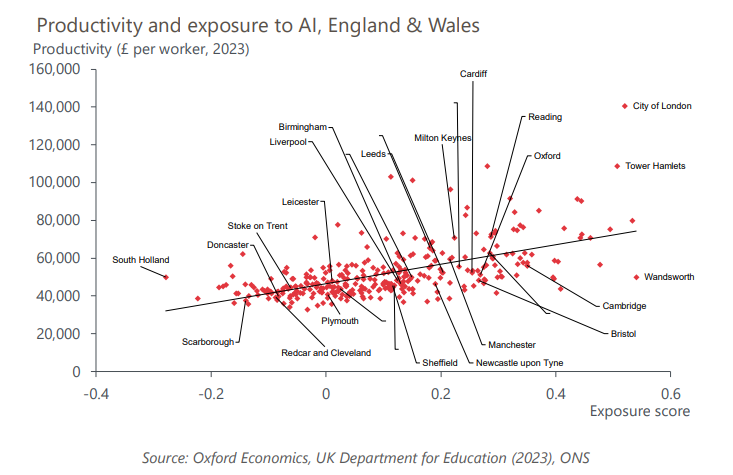AI may eventually widen the gaps between city economies
Artificial Intelligence (AI) is shifting the impact of automation towards highly-skilled, intellectual occupations, meaning that cities that are highly reliant on those occupations are more likely to be exposed. However, these cities could in fact benefit from significant gains in productivity, further deepening the gap between successful cities and other places.
What you will learn:
- Occupations that are most exposed to AI typically include higher-skilled ones. Indeed, AI exhibits skills that are needed in those occupations—such as analysing pieces of evidence, constructing an argument, and tailoring information delivery to suit different audiences. At the same time, AI can augment working, automating some tasks within a job while leaving time for other skilled tasks.
- Looking at the geographical impact of AI shows that places that are currently the most successful will often be the most exposed. In the US, the North East corridor and the Bay Area, where financial, ICT, and professional activities are largely concentrated, are largely exposed. In the UK, London and the South of England are likely to be more exposed.
- But far from being a great leveller and hence implicitly a threat to the most prosperous and expensive places, AI could give an extra boost to these already successful places, adding to existing geographical inequalities.

Tags:
Related Services

Service
Global Cities Service
Make decisions about market and investment strategies with historical data and forecasts for 900 of the world’s most important cities.
Find Out More
Service
City Scenarios Service
Assess the impact of risk scenarios on cities and regions Our service provides a baseline forecast and three alternative scenarios for a broad range of economic and demographic indicators for each location.
Find Out More
Service
City Climate Analysis
In-depth insights into the economic impacts of climate change and mitigation policies on cities and local economies throughout Europe, the US and Canada.
Find Out More